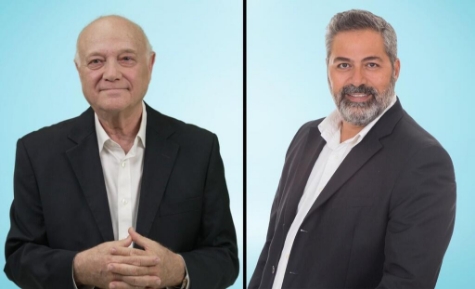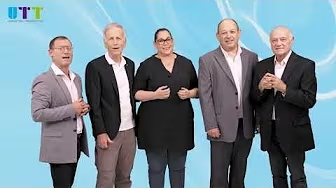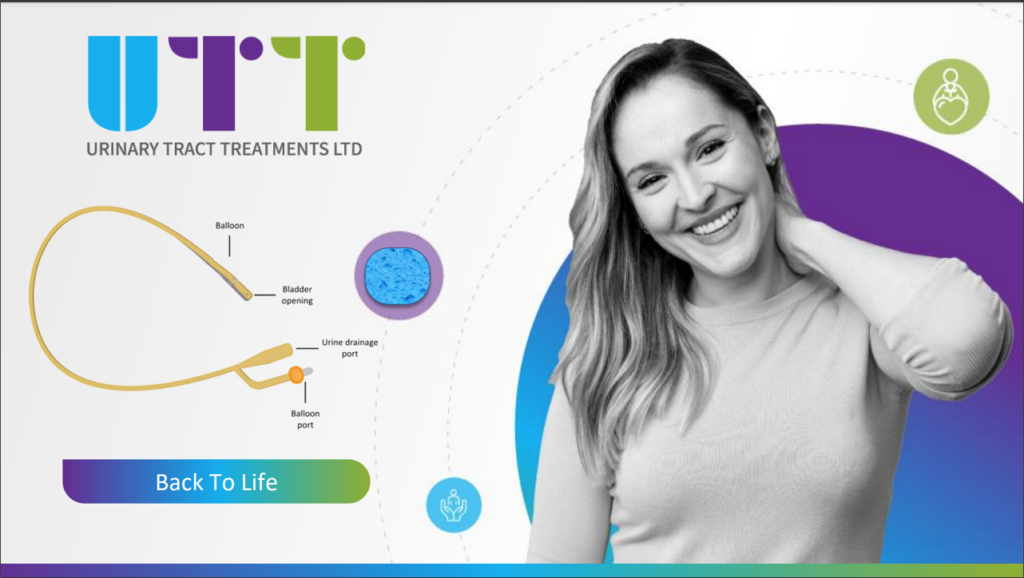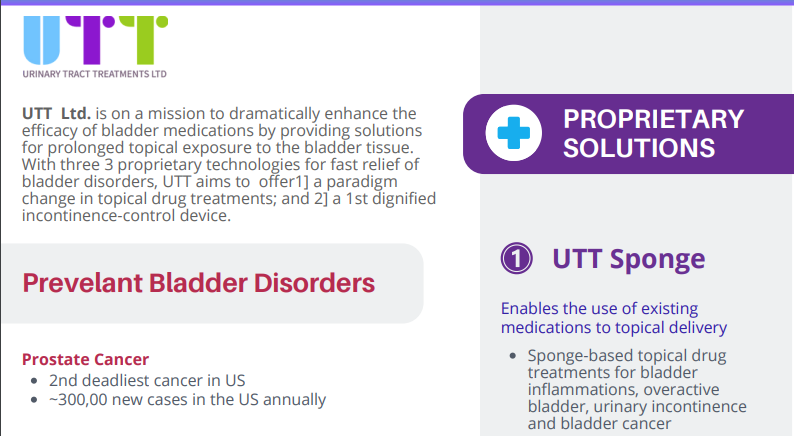- BACK TO LIFE.
A Revolutionary
Technology
for Urinary Tract Treatments
Targeting:
- Bladder Cancer
- Prostate Cancer
- Urinary Disease

WELCOME TO
.
is on a mission to dramatically enhance the efficacy of bladder treatments by providing solutions for prolonged topical exposure of drugs to the bladder tissue. UTT had developed 3 revolutionary technologies for fast relief of bladder disorders. UTT aims to offer:
• a novel incontinence-contol device
Our Technologies
.
1
Delivery sponge
A drug delivery sponge
UTT’s proprietary biodegradable sponge aims to enable topical delivery of existing medications for various urinary conditions. The sponge is designed to be inserted into the bladder via catheter, where it expands. This approach is being explored for potential applications in: bladder cancer bladder inflammation, overactive bladder, urinary incontinence, and bladder infection.
2
Treatment of Prostate cancer
A non surgical chemo ablation treatment for prostate cancer - Chemo Gel
UTT is developing a non-surgical alternative for prostate tumors using a proprietary liquid gel technology. The concept involves dissolving a chemotherapy agent into the gel, which is then designed to be injected into the prostate. The gel is intended to release the chemotherapy agent over a period of several days. This method aims to
3
Leakage-Control (ULC)
An in-dwelling magnetic bladder buoy
UTT Ltd patented a revolutionary leakage
control device (ULC) a magnetic floating buoy that is inserted into the bladder and is pressed against the bladder neck to provide a urine leakage barrier. The ULC is pulled by a magnetic pad, worn in the underpants. As the underpants are naturally removed, the buoy floats and voiding occurs naturally. The

A drug retention sponge
UTT’s biodegradable sponge: designed for targeted medication delivery in the bladder. Shown before and after compression, it’s inserted with a catheter and expands inside the bladder. This innovative approach is being explored for various urinary conditions, potentially offering localized treatment with different types of medications.
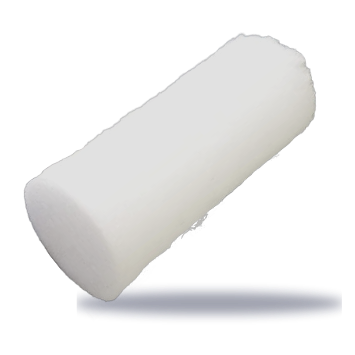
The Challenge
.
60% of the population will suffer from urinary tract disorders during their lifetime.
According to an estimate from 2018, 2.5 billion men and women worldwide suffer from at least one disease in the urinary system – including cancer, bacterial infections, urinary leakage, infections, and more. Some of these diseases are life-threatening, and some cause pain and affect the quality of life significantly and over time.
UTT’s biodegradable sponge is designed to deliver medications into the bladder in a controlled, sustained release profile for several weeks, before being expelled naturally and painlessly.
UTT’s innovative approach is adaptable for various drugs for a range of clinical indications – including prostate cancer, bladder cancer, chronic urinary tract infection, overactive balder, and more.
The bioavailability of most drugs for these problems is suboptimal, because the methods of administering the drugs are inefficient: orally administered drugs are not well absorbed in the bladder.
Topical (local) medications are washed out of the bladder in a short time.
UTT’s unique delivery technology overcomes the limitations and adverse effects that are associated with current treatments – providing an efficacious, safe and flexible drug delivery for optimal clinical effect:
- Systemic toxicity of orally and IV administered drugs
- Fast washout of transurethral administered medications
- Cystitis and other adverse events due to inconsistent drug concentration
- 2nd deadliest cancer in US
- ~300,00 new cases in the US annually
- Affects 800,000 patients/ yr in US
- 17,000 deaths/yr in the US
-
Affects over 50% of the global
population
- Affects over 25M people in US
- 75% of women at some level
- Affects 40% of women
- 30% of men in US
- Affects between 4-12M people globally
-
Symptoms include bladder and pelvic
pain, sexual complications
- 2nd deadliest cancer in US
- ~300,00 new cases in the US annually
- Affects 800,000 patients/ yr in US
- 17,000 deaths/yr in the US
-
Affects over 50% of the global
population
- Affects over 25M people in US
- 75% of women at some level
- Affects 40% of women
- 30% of men in US
- Affects between 4-12M people globally
-
Symptoms include bladder and pelvic
pain, sexual complications
Oral drugs have poor absorption in the bladder
Topical drugs are washed out of the bladder shortly after instillation

The Market
.
$6B
3.8% CAGR
The Vision
.
The sponge
Raising $300 K
Sponge
Patent
App
First-in-human
trial
Public Offering
July 2023
May 2024
Sep 2024
Oct 2024
Dec 2025
Jan 2026
July 2026
Crowd
funding
$1.7 M
Sponge POC
$
2nd round raising money

Treatment of Prostate cancer
Raising $300 K
Sponge
Patent
App
First-in-human
trial
Public Offering
May 2025
Aug 2025
Jan 2026
Dec 2026
Feb 2027
Dec 2027
Crowd
funding
$1.7 M
Sponge POC
$
2nd round raising money
Leakage-Control (ULC)
Raising $300 K
Sponge
Patent
App
First-in-human
trial
Public Offering
Dec 2025
July 2026
Jan 2027
Dec 2027
May 2028
Dec 2028
Crowd
funding
$1.7 M
Sponge POC
$
2nd round raising money
Card #1
ttt
ttt
Card #1
ttt
Card #1
The Vision
.
The sponge
July 2023
May 2024
Sep 2024
Oct 2024
Dec 2025
Jan 2026
July 2026
Treatment of Prostate cancer
May 2025
Aug 2025
Jan 2026
Dec 2026
Feb 2027
Dec 2027
Leakage-Control (ULC)
Dec 2025
July 2026
Jan 2027
Dec 2027
May 2028
Dec 2028
Cases
.
UTT is an innovative topical approach designed to deliver treatments directly to the urinary tract. This localized delivery method aims to concentrate the treatment where it’s intended, potentially minimizing exposure to other parts of the body while aiming to reduce side effects. Our goal with UTT is to explore new possibilities in urological care, including for conditions like bladder cancer, prostate cancer and UTIs, where targeted treatment could be particularly beneficial. By focusing on direct application to the urinary tract, UTT represents a novel strategy in the field of urology.
Bladder Cancer
Urinary tract infection (UTI) is primarily due to bacteria infection of the urinary tract.
Bladder infections affect, in common, over 60 % of women and over 20 % of men all over the world.They are treated by oral administration of antibiotics in simple cases for a short course or by IV for a longer course in complicated cases.
Over 50 % world wide population suffers from urinary tract inflammations. Low bioavailability limits the effect of systemic antibiotics.
Prostate Cancer
Urinary Incontinence (UI) involves involuntary urine leakage due to various disorders. Causes include weakened bladder support, weak urethral sphincter, or nerve damage. Lifestyle factors may worsen symptoms. UI of some level affects up to 75% of women over 65, especially during physical activities. Treatment options range from absorbent pads to surgery, with medications often prescribed despite limited efficacy and side effects.
Bladder Disorders:
Prostate Cancer
Bladder Cancer
Urinary tract inflammation
incontinence
Overactive Bladder
OAB
Interstitial Cystitis
IC
Urinary Tract
Bladder Cancer affects 800,000 patients in the USA, predominantly male smokers, causing 17,000 deaths annually. Most tumors grow on the bladder’s inner layer, with deeper growths being more challenging to treat. Treatment typically involves surgical removal followed by topical drug cycles or intravesical chemotherapy. Invasive tumors may require chemotherapy, radiation, or partial/total bladder removal. The UTT novel sponge enables chemo-ablation of bladder tumors by direct, prolonged exposure of the bladder tissue to chemotherapy.
Who We Are
.
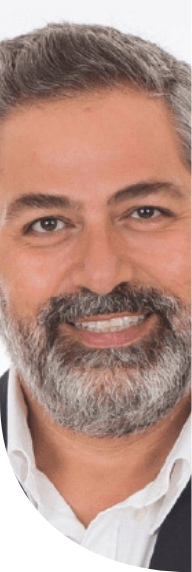
Eli Ben Haroosh
CEO, Founder, and Director
Stickit, Vonetize, Premier-Dead Sea
Eli is a seasoned executive and entrepreneur with a proven track record of leading and growing successful businesses in various fields. He recently served as the President of Vonetize, a stock exchange company that provides premium content and technology
solutions. Before that, he was the VP and CEO of Premier – Dead Sea, a global leader in skincare products. He oversaw sales in 74 countries and nearly 1000 sales points, generating tens of millions of dollars a year. Eli currently serves as the director of several companies such as Zero Candida, Bio Micro Science and most recently Donnie Ltd.


Asher Holzer, PhD
president, Founder
UroGen, InspireMD, BioSig Technologies, TheraCoat
Asher is a serial entrepreneur and a senior executive in the medical equipment industry. He has over 30 years of experience in founding, leading, and taking several public companies that have created and marketed cutting-edge medical technologies and solutions. Some of his notable ventures include UroGen, InspireMD, BioSig, and TheraCoat. He holds a Ph.D. in nuclear physics from the Hebrew University and has a passion for innovation and excellence in the healthcare field.

Jaime de la Zerda, PhD
Advisor
Jaime de la Zerda, PhD, serves as the Chief Chemist at Urinary Tract Treatments, specializing in gel-based drug release devices. With a PhD in Applied Chemistry, Jaime has extensive experience as a formulation chemist and excels in implementing chemical innovations in the medical field, specifically in the treatment of urinary tract diseases. A seasoned industrial chemist and lecturer in academia, Dr. de la Zerda has a proven track record in applied research, product formulation, and quality systems implementation. Passionate about addressing technological challenges that bring valuable products to the medical field, Jaime is committed to advancing UTT’s mission through technological development and innovation.

Eng. Yosh Dollberg
VP
UroGen, Pontifax Group,
Dollberg was an experienced hi-tech/biotech c-level executive. Held VP positions in Cubital, Direx & Orbotech, member of the founding team of Urogen Pharma (ticker: URGN) that developed drug treatments for urinary tract cancer. Named inventor in >15 patents and co-autor of several peer-reviewed articles. Dollberg joined the UTT team with the belief that UTT can bring real value to bladder disorders treatments.

Irene Zeitoun, PhD, MBA
COO & Chief Research Officer
Ms. Zeitoun has over 20-year experience in managerial roles in biotech and pharma ventures. Irene was the WW Marketing Director of Mindset BioPharmaceuticals and MindGenix in the field of Alzheimer’s Disease. She was the Director of R&D at Ester Neurosciences and the Project Manager of the Israeli National Tissue Bank for research Purposes. Dr. Zeitoun was the Manager of Industrial Research Services of Ramot at Tel-Aviv University. She was the BD & Marketing Manager of the accelerator Targetech and was the Operations Manager of Targia Pharmaceuticals.
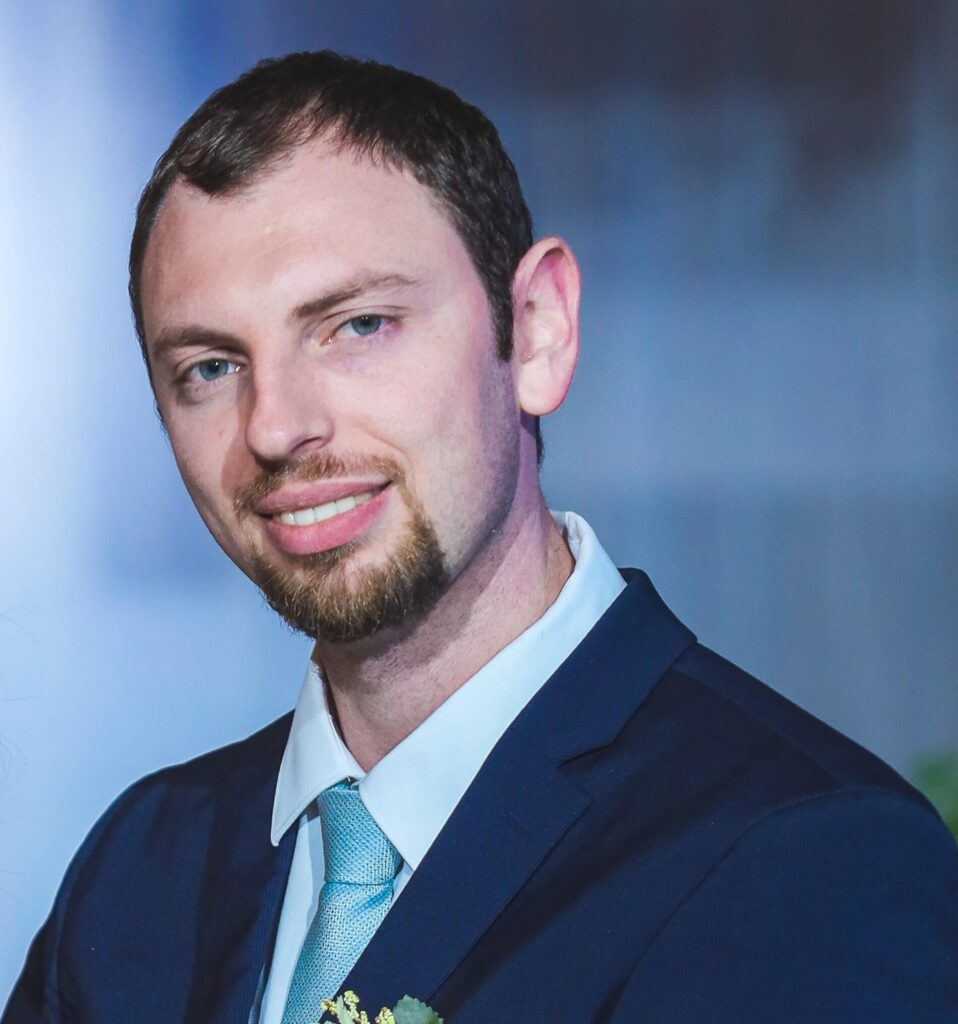
Boris Rozenblit MSc
Analytical R&D manager
Boris Rozenblit is a biotechnology engineer with a BSc and MSc from the Technion – Israel Institute of Technology. With nearly 10 years of experience in the biotechnology field, Boris has built a strong foundation in R&D engineering and project management. Throughout his career, Boris has been involved in driving innovation and managing challenging projects, demonstrating a deep understanding of biotechnological advancements and strategic execution.

Dr. Shira Chatumi, MD
Director
Clalit Health Services
Dr. Chatumi is a board certified senior urology specialist and consultant, acting as the medical director of the largest specialist clinic of \”Clalit\” medical services in Tel Aviv. Acted as the head of ambulatory urology in the IAU during the years 2013-2018. As a leader in urology in Israel, she is a highly sought-after lecturer and medical instructor for students and interns. Dr. Chatumi is an activist for promoting diversity and inclusion in the Israeli urological association and in medicine as a whole.

Dr. Susan Alpert, PhD, MD
Director
SFA Regulatory, LLC, Medtronic, US FDA
Alpert, Ph.D., M.D. is currently the principle of SFADC LLC (aka SFA Regulatory, LLC), a one-person firm focused on the strategies needed to place medical devices and other medical products into the global market. She was a Corporate Senior Vice President for Global Regulatory at Medtronic, Inc. and prior to that, VP Regulatory Science at C.R. Bard, Inc. She previously worked at the US FDA where she held a variety of management positions. Susan is a microbiologist and pediatrician with a specialty in infectious diseases.

Professor, Lior Nesher, MD
Director
SUMC, BenGurion University
Nesher is the director of the Infectious
Disease Institute at Soroka University Medical Center (SUMC), a 1,100-bed referral hospital providing medical care for over 1,000,000 people in the southern part of Israel. Immunocompromised patients, especially cancer and transplant recipients, and antibiotic stewardship systemic interventions lead the COVID-19 response at SUMC. Prof. Nesher is a tenured faculty member of the Faculty of Health Sciences, BenGurion University of the Negev, a member of the European Society Clinical Microbiology, Infectious Disease (ESCMID), as well as an executive board member of the ESCMID study group on respiratory viruses (ESGREV).

Professor, David Margel, MD
Director
Raphael Hospital, Rabin Medical Center,
Dr. Margel, professor of surgery, is currently the Medical Director of Raphael Hospital and founding director of Men\’s Health. As a surgeonscientist, he founded the Rabin Medical prostate cancer focal treatment program and the male BRCA comprehensive research unit and clinic. Dr. Margel\’s research program, which spans from bench to bedside, focuses on the biology and genetics of urological cancers and cardio-oncology. He serves as the principal investigator for multiple clinical trials evaluating novel therapy technologies, genetics as well as other aspects to provide better care and less toxic treatments for patients.
Media & Investors
.
Blog
.

Understanding Urinary Tract Infections in Women Over 70

Understanding Urinary Tract Infections in Women Over 60

Understanding Urinary Tract Infections in Women Over 50


